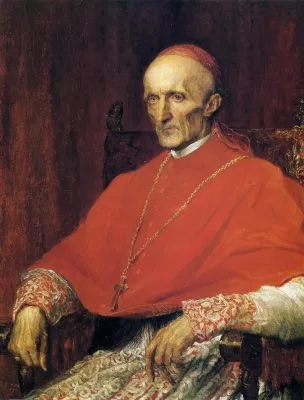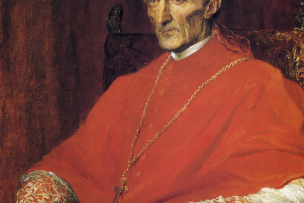Cardinal Manning and the Great Dock Strike 1889

Cardinal Manning
The Great Dock Strike is widely acknowledged as a key event in the development of the modern trade union and labour movement in this country. Following on from earlier strikes by match girls and gasworkers, the dock strike signalled a remarkable new era of leadership and organisation in the working classes, contributing to, among other things, the formation of the Labour Party in 1900.
The lives of the dockers and many others in the dock side communities at the time were marked by crushing poverty, disease, squalor and horrendous living and working conditions. The pivotal points at issue during the strike were over a very modest increase in pay of 6d (six old pennies, colloquially called the 'Dockers tanner') to something approaching enough for a docker and his family to live on, and assurance that no man would be taken on for less than four hours a day. The similarities between these demands 125 years ago and the petitions of the current campaigns for a Living Wage and an end to 'zero-hour' contracts are clear to see.
Cardinal Henry Manning and many others were deeply alarmed about the impact and harsh reality of free market capitalism on the vast majority of people in working communities. The Cardinal would go on to say: "The capitalist is invulnerable in his wealth. The working man without bread has no choice but either to agree or to hunger in his hungry home. For this cause 'freedom of contract' has been the gospel of the employers, and they have resented hotly the intervention of peacemakers. They have claimed that no one can come between them and their men; that their relation to them is a private, almost a domestic affair. They forget that when thousands of women and children suffer while they are refusing to grant a penny more in wages, or an hour less in work, there is a wide field of misery caused by their refusal to negotiate in this strike. It is not a private affair; it is a public evil…"
For a month the strike threatened to bring the nation's economy to a halt and cause widespread civil disorder. But Manning was quick to credit the 'singular self-command and order' that characterised the strike and noted that it 'had not been stained by anything which would detract from its honour'. There was a remarkable degree of solidarity between different ethnic groups and faiths and during the strike. In London's east end the Jewish community led a solidarity march with the dockers - a large proportion of whom were Irish Catholics - and together with the Salvation Army provided soup kitchens for the dockers' families and children. The Irish dockers would get their opportunity to return the gesture of solidarity in the Cable Street riots nearly half a century later when in 1936 the 'Blackshirts' targeted the local Jewish community in Stepney.
On the 14th September 1889, the strike leaders, led by future MPs John Burns and Ben Tillett, negotiated an end to the strike with the dock managers, mediated by the 81 year-old Cardinal Manning, who had the utmost respect of all those involved in the negotiations. The dockers key demands were met and the power of mass organisation, discipline and resilience were ably demonstrated.
Observing this from Rome was Pope Leo XIII who was regularly kept informed by the Cardinal on many social issues, in particular the conditions of the working classes in poor communities. Two years later Leo would go on to write the great social encyclical Rerum Novarum, 'Of New Things', which addressed the dignity and rights of working people in an age where such concepts were generally not accepted. This encyclical is widely regarded to be the foundation of modern Catholic social teaching from which we derive principles such as solidarity, dignity, participation and the common good. It owes much to Manning's deep concern and reflection on the welfare of the working poor in his parish communities and those more widely across the country. Ben Tillett would later reflect on Manning's personal influence:
"I could not withstand this gentle old man, who touched so tenderly the heart-strings of his hearers with solemn talk about the sufferings of wives and children, or impress him with a summary of social needs and economic complexities multiplying in the prolongation of the Strike. I never look back on that meeting without a sense of nightmare, but there was a final judgment and the Cardinal won".
At a recent conference on Cardinal Manning and Catholic social teaching, the Labour peer Lord Maurice Glasman reflected on the legacy of the Great Dock Strike and the influence of Manning on us today. Manning was 'stubborn, organised and faithful' in his belief and determination to repel the injustices faced by working people in his time. He was resilient to see the negotiations through to the end when others walked out; he knew that only good and effective organisation could achieve the desired result; and, ultimately, he was faithful to the Catholic tradition which fashioned his principles and his belief in the inherent dignity of all human beings.


















